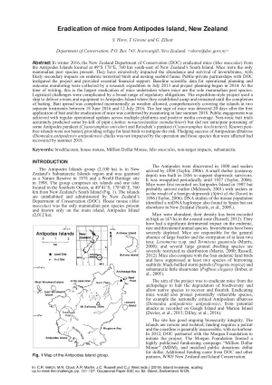Eradication of mice from Antipodes Island, New Zealand
- Description:
- In winter 2016, the New Zealand Department of Conservation (DOC) eradicated mice (Mus musculus) from the Antipodes Islands located at 49°S 178°E, 760 km south-east of New Zealands South Island. Mice were the only mammalian pest species present. They have extensively impacted the abundance and survival of invertebrates, with likely secondary impacts on endemic terrestrial birds and nesting seabird fauna. Public-private partnerships with DOC instigated the project and provided essential financial support. Baseline scientific data for operational planning and outcome monitoring were collected by a research expedition in July 2013 and project planning began in 2014. At the time of writing, this is the largest eradication of mice undertaken where mice are the sole mammalian pest species. Logistical challenges were complicated by a broad range of regulatory obligations. The expedition-style project used a ship to deliver a team and equipment to Antipodes Island where they established camp and remained until the completion of baiting. Bait spread was completed incrementally as weather allowed, comprehensively covering the islands in two separate treatments between 18 June 2016 and 12 July 2016. The last sign of mice was detected 20 days after the fi rst application of bait and the eradication of mice was confirmed by monitoring in late summer 2018. Public engagement was achieved with regular operational updates across multiple platforms and positive media coverage. Non-toxic bait trials accurately predicted some by-kill of pipit (Anthus novaeseelandiae steindachneri) but did not anticipate poisoning of some Antipodes parakeet (Cyanoramphus unicolor) and Reischeks parakeet (Cyanoramphus hochstetteri). Known pest-free islands were not baited, providing refuge for land birds to mitigate the risk. Fledging success of Antipodean albatross (Diomedea antipodensis antipodensis) chicks was not impacted by the operation and those species that were affected had recovered by summer 2018.
- Display date:
- 2019
- Location:
- Pacific Region
- Collections:
- Secretariat of the Pacific Regional Environment Programme (SPREP)
- Publisher:
- International Union for Nature Conservation (IUCN)
- Content partner:
- Secretariat of the Pacific Regional Environment Programme (SPREP)
- Availability:
- Not specified
-
Copyright status: All rights reservedFind out more about what you are able to do with this itemThis item is all rights reserved, with means you'll have to get permission from Secretariat of the Pacific Regional Environment Programme (SPREP) before using it. For more information, please see our use and reuse page.What can I do with this item?Non-infringing useNZ copyright law does not prevent every use of a copyright work, and this item may be hosted by an international institute or organisation. You should consider what you can and cannot do with a copyright work.No sharingYou may not copy and/or share this item with others without further permission. This includes posting it on your blog, using it in a presentation, or any other public use.No modifyingYou are not allowed to adapt or remix this item into any other works.No commercial useYou may not use this item commercially.
Related items
Welcome and warm Pasifik greetings
The information on this site has been gathered from our content partners.
The names, terms, and labels that we present on the site may contain images or voices of deceased persons and may also reflect the bias, norms, and perspective of the period of time in which they were created. We accept that these may not be appropriate today.
If you have any concerns or questions about an item, please contact us.
